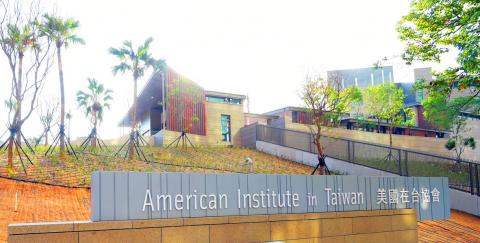Sixteen US senators on Monday wrote a joint letter urging US President Donald Trump to send a Cabinet official to Taipei next month to attend a major event to be held by the American Institute in Taiwan (AIT).
The AIT on April 15 is to hold an evening reception at its new facility in Neihu District (內湖) to celebrate the 40th anniversary of the Taiwan Relations Act, which the US senators said has served as the cornerstone of US policy toward Taiwan, and helped maintain peace, security and stability in the Indo-Pacific region against an “increasingly aggressive” People’s Republic of China.
“The event provides an ideal opportunity, consistent with the requirements set forth in the Taiwan Travel Act (Public Law 115-135) that you signed into law on March 16, 2018, to send a Cabinet-level official to Taipei to underscore our nation’s enduring commitment to Taiwan’s democracy and its people,” the letter said.

Photo: Chang Chia-ming, Taipei Times
The provisions of the law were further reaffirmed in the Asia Reassurance Initiative Act, which was signed into law on Dec. 31 last year, they said.
“We believe that travel of this nature is important to ensure we are acting in accordance with our commitments under the Taiwan Relations Act, especially given Chinese efforts to change the cross-strait status quo,” the letter said.
The senators said they believed that the presence of a Cabinet-level US official at the AIT event would “send a strong signal of American’s unwavering commitment to and support for one of our strongest partners in the region.”
The letter was drawn up by US senators Marco Rubio, a Republican, and Bob Menendez, a Democrat. It was cosigned by nine Republican senators — Cory Gardner, Jim Inhofe, John Cornyn, Johnny Isakson, Tom Cotton, Marsha Blackburn, Rick Scott, Josh Hawley and Mike Rounds — and five Democrats — Chris Coons, Tammy Duckworth, Ron Wyden, Ben Cardin and Edward Markey.
The last visit to Taiwan by a US Cabinet official was in 2014, when then-US president Barack Obama’s administration sent then-Environmental Protection Agency administrator Gina McCarthy.
AIT spokeswoman Amanda Mansour yesterday told the Taipei Times that the AIT would invite prominent people from the US and Taiwan to the celebration, including members of the US Congress.
However, she did not address the possibility of a visit by a Cabinet-level official.
“For decades, US-Taiwan cooperation has enjoyed strong, bipartisan support, including for exchanges of high-level visits, as outlined in the Taiwan Relations Act,” Mansour said, adding that the reception would be part of the AIT’s year-long campaign to recognize the robust US-Taiwan partnership that has developed over the past 40 years.
The Ministry of Foreign Affairs thanked the senators for the bipartisan support they have shown Taiwan.
“Our government will continue to stay in close contact with the US to seek visits by high-level US officials, so that they can join us in witnessing the robust development of Taiwan-US relations,” the ministry said.

NATIONAL SECURITY THREAT: An official said that Guan Guan’s comments had gone beyond the threshold of free speech, as she advocated for the destruction of the ROC China-born media influencer Guan Guan’s (關關) residency permit has been revoked for repeatedly posting pro-China content that threatens national security, the National Immigration Agency said yesterday. Guan Guan has said many controversial things in her videos posted to Douyin (抖音), including “the red flag will soon be painted all over Taiwan” and “Taiwan is an inseparable part of China,” while expressing hope for expedited “reunification.” The agency received multiple reports alleging that Guan Guan had advocated for armed reunification last year. After investigating, the agency last month issued a notice requiring her to appear and account for her actions. Guan Guan appeared as required,

DAREDEVIL: Honnold said it had always been a dream of his to climb Taipei 101, while a Netflix producer said the skyscraper was ‘a real icon of this country’ US climber Alex Honnold yesterday took on Taiwan’s tallest building, becoming the first person to scale Taipei 101 without a rope, harness or safety net. Hundreds of spectators gathered at the base of the 101-story skyscraper to watch Honnold, 40, embark on his daredevil feat, which was also broadcast live on Netflix. Dressed in a red T-shirt and yellow custom-made climbing shoes, Honnold swiftly moved up the southeast face of the glass and steel building. At one point, he stepped onto a platform midway up to wave down at fans and onlookers who were taking photos. People watching from inside

A Vietnamese migrant worker yesterday won NT$12 million (US$379,627) on a Lunar New Year scratch card in Kaohsiung as part of Taiwan Lottery Co’s (台灣彩券) “NT$12 Million Grand Fortune” (1200萬大吉利) game. The man was the first top-prize winner of the new game launched on Jan. 6 to mark the Lunar New Year. Three Vietnamese migrant workers visited a Taiwan Lottery shop on Xinyue Street in Kaohsiung’s Gangshan District (崗山), a store representative said. The player bought multiple tickets and, after winning nothing, held the final lottery ticket in one hand and rubbed the store’s statue of the Maitreya Buddha’s belly with the other,

‘NATO-PLUS’: ‘Our strategic partners in the Indo-Pacific are facing increasing aggression by the Chinese Communist Party,’ US Representative Rob Wittman said The US House of Representatives on Monday released its version of the Consolidated Appropriations Act, which includes US$1.15 billion to support security cooperation with Taiwan. The omnibus act, covering US$1.2 trillion of spending, allocates US$1 billion for the Taiwan Security Cooperation Initiative, as well as US$150 million for the replacement of defense articles and reimbursement of defense services provided to Taiwan. The fund allocations were based on the US National Defense Authorization Act for fiscal 2026 that was passed by the US Congress last month and authorized up to US$1 billion to the US Defense Security Cooperation Agency in support of the